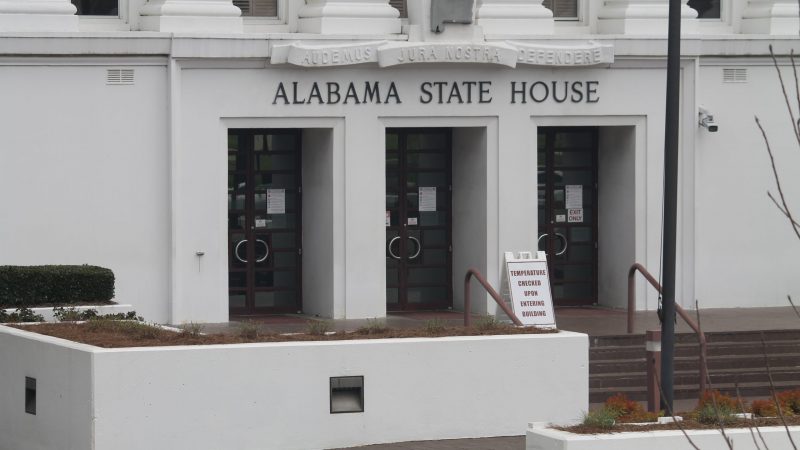Lawmakers face decisions on $1.5 billion in relief funds
MONTGOMERY, Ala. (AP) — Alabama lawmakers face decisions in the coming months on how to spend more than $1.5 billion in pandemic relief funds, and legislative leaders say infrastructure projects — such as broadband and sewer projects — are expected to be a spending priority.
Congress allocated $2.12 billion for Alabama through the American Rescue Plan. The state received the first half in June and has $580 million remaining after steering $80 million to hospitals and nursing homes and $400 million on a controversial prison construction plan. The state will receive a second $1.060 billion in May or June of this coming year. The state also has $191 million allocated through the America Rescue Plan’s Capital Projects Fund.
Senate President Pro Tempore Greg Reed, R-Jasper, said how to use the money will be one of the major issues before lawmakers in the session that begins Jan. 11. He said proposals are still being developed, but he expects money to be steered toward a combination of local and regional projects as well as reimbursements to hospitals and other health care providers that have been hard hit during the pandemic.
“You’re going to be looking at projects that are going be for individual communities,” Reed said adding that would likely be done by establishing a grant or application process.
He said they are also considering line-item expenditures for “major projects that are going to be regional projects” as well as tasking the Department of Finance with managing additional reimbursement to health care providers. “There would be potentially additional dollars in healthcare that would need to go over and above the resources that we’ve already given that would go for reimbursement with hospitals, nursing homes, others.”
Senate Finance and Taxation General Fund Chairmen Greg Albritton, R-Atmore, said legislative leaders plan to meet with Gov. Kay Ivey next week. He said every lawmaker has their own idea of how the remaining $580 million should be utilized.
“I want this money to be invested in the future, not paying for the past. I want this money to go into matters that will make a difference for the next generation,” Albritton said.
House Ways and Means General Fund Chairman Steve Clouse, R-Ozark, said he expects lawmakers will allocate the $580 million this session and leave decisions on the $1 billion — which the state won’t receive until after the session is concluded — until a later time.
He anticipates a large amount of money will be put toward rural broadband and water and sewer projects. Clouse said the pandemic highlighted the lack of internet access with many children not having internet access as they tried to learn from home.
“I don’t think we need to get into operating expenses and stuff that is going to require recurring revenue streams. This should be one-time capital type projects,” Clouse said.
Alabama took criticism for using $400 million of pandemic relief funds for prison construction. Legislative Republicans said it was an allowed use, but critics argued it was not a proper use of the money.
“Maybe our priorities will finally catch up after our $400 million we spent on prisons,” Rep. Chris England, D-Tuscaloosa, said.
England said hospitals and nursing homes will be seeking additional resources, which he said is “especially relevant now that it looks like we are in the middle of another surge.” Hospitals have seen labor costs surge as they turn to contract travel staff to fill staff shortages as well as expenses for setting up clinics for monoclonal antibodies.
“We’ve missed several opportunities to spend a lot of that money on education. While we were running CRT (critical race theory) out of the classroom, we ignored COVID sitting right there. We probably need to focus a little bit more resources on making sure our kids are safe from a real problem, versus an imaginary one,” England said.
Pentagon puts Scouts ‘on notice’ over DEI and girl-centered policies
After threatening to sever ties with the organization formerly known as the Boy Scouts, Defense Secretary Hegseth announced a 6-month reprieve
President Trump bans Anthropic from use in government systems
Trump called the AI lab a "RADICAL LEFT, WOKE COMPANY" in a social media post. The Pentagon also ordered all military contractors to stop doing business with Anthropic.
HUD proposes time limits and work requirements for rental aid
The rule would allow housing agencies and landlords to impose such requirements "to encourage self-sufficiency." Critics say most who can work already do, but their wages are low.
Paramount and Warner Bros’ deal is about merging studios, and a whole lot more
The nearly $111 billion marriage would unite Paramount and Warner film studios, streamers and television properties — including CNN — under the control of the wealthy Ellison family.
A new film follows Paul McCartney’s 2nd act after The Beatles’ breakup
While previous documentaries captured the frenzy of Beatlemania, Man on the Run focuses on McCartney in the years between the band's breakup and John Lennon's death.
An aspiring dancer. A wealthy benefactor. And ‘Dreams’ turned to nightmare
A new psychological drama from Mexican filmmaker Michel Franco centers on the torrid affair between a wealthy San Francisco philanthropist and an undocumented immigrant who aspires to be a dancer.







